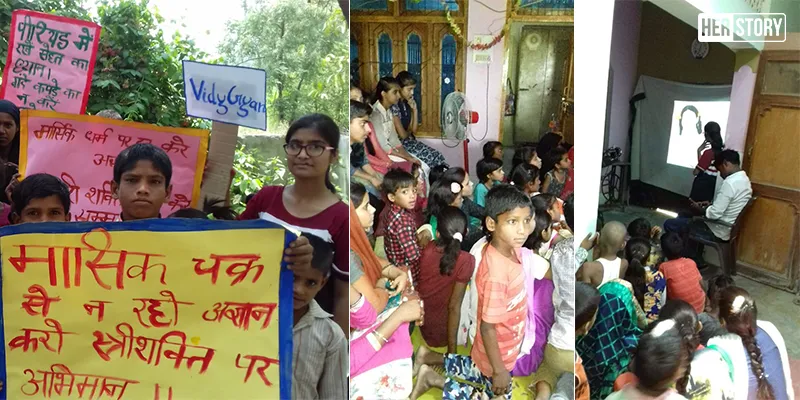How a 16-year-old girl is breaking the silence surrounding menstruation and menstrual hygiene in her village
Shikoh Zaidi, 16, is on a mission to create awareness about menstruation and menstrual hygiene in her village in Uttar Pradesh by rallying women and young girls, and advocating the use of sanitary napkins.
Life isn’t easy for a 16-year-old girl in Kuwarpur Baghel village in Hardoi district of central Uttar Pradesh. Especially if you’re raising the curtains on a topic no one wants to talk about.
Menstruation.
But that didn’t stop Shikoh Zaidi from going from home to home in her village to rally women and girls, and speak to them about menstruation.
And much to her mother’s chagrin, Shikoh is accompanied by her abbu (father). For almost one year she has been speaking to girls in her village about menstruation and menstrual hygiene, and advocating the use of sanitary napkins.
Her mother isn’t very happy about her speaking so openly about menstruation, but Shikoh has her father’s complete support. But getting to this point hasn’t been easy.

Shikoh's efforts at spreading awareness about menstruation
Not willing to stay Chup
Shikoh is a student of VidyaGyan Leadership Academy, a residential school for underprivileged meritorious students. As part of a reading assignment for improving her command over English she read Deepa Narayan’s famous book on gender equality, Chup: Breaking The Silence About India's Women, when she was 15 years old.
Deepa, the Founder of Gender Action Lab, has authored around 17 books; Chup stands out as a mirror for Indian women and showcases how certain habits that women across India have are detrimental to their being. The book touched a chord with Shikoh, leading her to speak about something she realised had been pushed under the carpet for long.
Menstruation is a major challenge
Data shared by India’s National Family Health Survey 4 includes a PSI report that claims that there are approximately 93 million adolescent girls and young women in the age group of 15-24 who need sanitary products. Of these, approximately, 41 percent (37.7 million) exclusively use homemade cloth products. Another 38 percent (35.4 million) exclusively use commercial products while 21 percent (19.2 million) use a mix of commercial and homemade products. Less than 1 percent (0.5 million) reported using other or no products.
Shikoh realised that this was at the root of the challenge that girls and women in her village faced, and she decided to bring about change. She first spoke to her teacher who encouraged her to start an awareness campaign in her village.
“When I went back home to my village I went and spoke to my ammi and my baba jaan about it. I had the full support of my baba jaan, who went with me door to door to call people to gather and collect young girls and mothers so they could speak about this matter.”
How do the gatherings work? Shikoh screens an animated video and talks about menstruation.
“Women here mostly use cloth because of its low cost and easy accessibility. I tell them about sanitary pads; I also showed them how to use pads. The first time I demonstrated how to use a pad, I was met with giggles, some not so happy faces and some amazed looks on how I could openly talk about such a subject.”
Her mother was uncomfortable with “being so open”, but Shikoh’s determination pushed her to break the silence. “It is a natural thing and something everyone knows about. My mother kept saying it’s not good to openly talk about it like this, but I reiterated that it is important to have this discussion.”
Shikoh recalls that initially gathering the girls and their mothers was a challenge. But she didn’t give up. She also included her father and some other men in the conversation, pointing out that men were fathers of girls and needed to know.
Her father has been her ‘pillar of support’, showing that menstruation is something that needs the support of all genders.
Also read: Meet the men taking on the task of challenging taboos around menstruation
Access to sanitary pads
However, the challenge - despite the awareness that Shikoh is spreading – remains access to sanitary pads. “Currently, sanitary pads are available at the block chikitsalaya about 20 km from the village. I am trying to work on how the government can provide free sanitary pads in bulk to Asha didi (a trained female community health activist) in her village who can then issue it to the girls in her village.”
Shikoh’s efforts are a stark reminder on this Menstrual Hygiene Day that despite all the work and effort we are putting into this sector, women in villages across India still have no idea about menstrual hygiene and safe practices during periods.
While awareness and education are the first steps in this direction, the big change will come only when the government backs the efforts youngsters like 16-year-old Shikoh are making.
Shikoh is in Class XII and wants to become a Civil Servant or study International Law so she can change the world but right now her main aim is to make sure that women in her village understand the basics of menstrual hygiene and get access to sanitary pads to live a better and healthy life.







